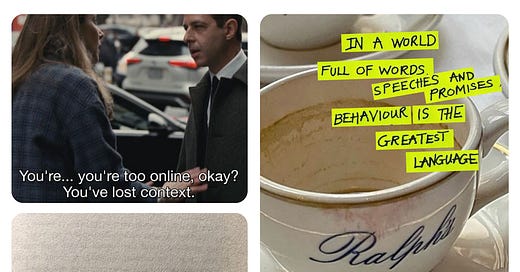no idea is original (and the algorithm is trolling you)
the online obsession with creative sameness
It’s my literal job to consume content with a critical eye — to catch the overlap in conversations, examine the common threads, make meaning of the topics that are making their rounds.
I notice the onset of trends before other people, not because I’m so fucking cool and plugged in but because I’m so fucking plugged in, period.
This week, especially, it has not felt “cool.”
It’s felt a bit manic, if I’m honest.
Something that I sidestep on the internet through cute expressions like ~*my latest snack fixation!*~ is that I am clinically obsessive.
Words get stuck in my head on loop like an itch I can’t scratch until I follow them down the rabbit hole and come out with some kind of… proof. Once upon a time it was song lyrics and movie quotes and things said in arguments with my parents. Now, it’s online sameness.
This makes me very good at my job and it also makes me feel kind of insane.
I can tell I’ve been consuming entirely too much internet when my ability to spot a phrase and know immediately that it’s been used by someone else within the same industry is so sharp it’s like the words glow off the screen, guiding me to my next quest:
Confirming it.
This has been one of those weeks.
A few days back, a pair of words sparkled at me from one of my peer’s Instagram bios. A lovely piece of alliteration and one that I had seen, months before, in the bio of another, down to the punctuation.
In a separate instance, someone offhandedly mentioned the new program they’re launching and in my mind’s eye, the name looked infrared, radiating the heat of having already been sold by someone else last year.
As I’m noticing these things, it’s without judgement.
Professionally, I don’t think it’s a big deal.
Nobody owns words, as much as people try to.
I just have a compulsion to complete the pattern — quietly confirm it, and move on.
Two weeks ago, I had some messaging delivered of my own.
A whole language to sink my teeth into, stacked with statements I’d never used or even heard before. Words that hadn’t been in my repertoire yet — movement, revolution, gravity, expression, influence, culture — opening my eyes to new ways I can define and categorize the conversations I’ve already been having.
The experience put my obsessive word-matching into stark perspective, as I fell into attachment with my shiny combinations of letters only to have them pressed like a bruise when I’d notice them elsewhere.
But of course, I’d notice them elsewhere.
Nobody owns words.
The fact I’ve made a hobby of hunting for creative crossover doesn’t make me immune to it.
“Movement” in a friend’s story, then on another friend’s sales page. Both of those friends having worked together so I’m not sure who started using it first, not that it matters, because the answer is neither.
Nobody owns words.
None of us get to say we started it.
My messaging document also mentions “social gravity,” and before opening it up, I’d never seen that phrase in my life. I’d never written it, never spoken it (still haven’t, ‘til right now).
But the day after I read it for the first time, I was fed a Substack article with “Social Gravity” in the title by someone I don’t follow. The day after that, I saw a Thread that included it, by someone I’ve recently started engaging with.
This is when I realized that my compulsion to collect evidence of online sameness isn’t my obsession alone:
The algorithm has been helping me, all along.
At first it sounds kind of fucked up, right?
Like, the algorithm exists to make sure we copy each other and then also, to make sure we know it?
Not only does it quiet our independent thought, it seeks to humble us whenever we think we’ve had one???
Asshole.
But then I started thinking: why?
It’s easy to forget (when we’re feeling fucked over by it) that the algorithm is actually, technically, working in our best interest.
It wants us to find likeminded community.
It wants us to find places to belong.
If a robot — who has access to nothing but a database of a bunch of words and images — is meant to help us find those things, it’s gonna group all the words and images together into a feed that looks and sounds homogenous.
In this way, then, creative sameness isn’t a sign of competition — it’s a sign of connection.
Wait, did I just make the algorithm sound kind of cute?
Let’s keep going there, for a minute:
I host in-person workshops, co-founded a retreat brand, and lead industry conversations in the IRL as much as possible.
In a room full of people, that moment of “wait, me too!” is a deep and long-desired exhale.
There’s no knot in the gut of omgtheyrecopyingme.
In fact, what we crave more than anything when we’re opening ourselves up to a group, in the flesh, is for someone to say:
“Same.”
I felt this with a friend a few months ago, swapping stories from our party girl pasts. I used to hold a lot of shadows and shame around that era of my life, so whenever I learn that I haven’t had a unique experience, I feel RELIEF.
And yet, online, we think we’ve done something wrong when the algo serves us a sentence that we’ve said before… Or, we think that whoever typed it has.
All of this leaves me wondering if we’re putting too much weight on the words, and not enough on the story.
The online world offers us hard evidence, where side by side on screen we can see: identical.
We absorb this as a mistake, an error, something we should delete because we can get caught for it, and yet, it’s just an invitation to say… same. If there’s overlap in words, then there’s overlap in experiences — which should come with relief, not retribution.
The algorithm doesn’t want us to feel original, because it wants us to feel seen.
The more we try to possess our words, the further we get from hearing each other’s stories.
The more we resist saying, “same,” the more we close ourself off from the healing power of hearing it.
𐄂𐄂
IMAGE LINKS:
Too Online
Behaviour
Be Hot
Coffee
Just Grow
Trust
ICYMI:
a how-to guide for transcending the tech idiocracy
Last week, I put words to the truth that most (if not all) social platforms are now being directed (if not overtly controlled) by forces and perspectives that we just don’t fucking believe in.













I love this so much. I literally mute 90% of other designers on all platforms because I’m so nervous that I am going to accidentally consume something, copy them down the line, and then get cancelled for it. Please keep shouting about this because I’d love to get to a world where we say “same!”
🤯🤯🤯 this was a super fucking valuable read and I’m kind of stunned now by the realizations. Also it’s highlighting and putting language to why substack has felt like such a warm and cozy place for me to hang lately. I’ve seen so many creators linking to others’ work (websites, other substacks & articles, social posts etc) within their own articles and notes that riffing on the words and thoughts of others just feels natural, seamless, and welcomed here, whereas Instagram specifically feels clunky in this aspect.